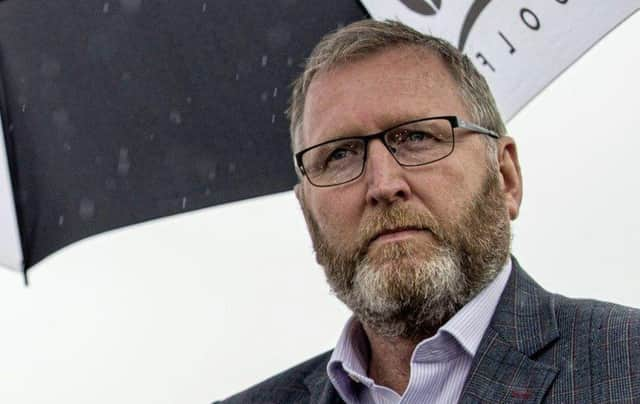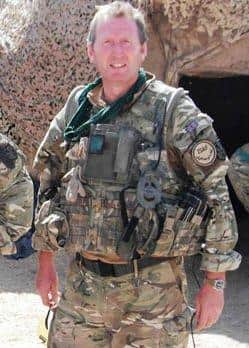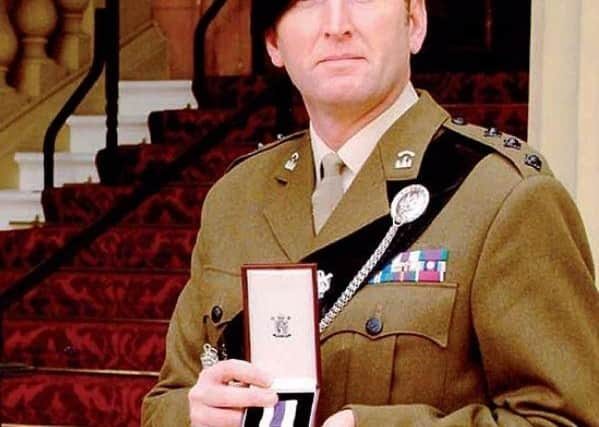‘I reached out to God while sleeping in a half-dug Afghan grave’


In 2006 when he was dispatched to Afghanistan, the then Captain Doug Beattie had understood he would be sitting behind a desk in Kandahar as intelligence liaison officer for Task Force Bayonet. When he got there they laughed at him. That patrol had left the besieged country two years ago and instead he was immediately sent off in a helicopter to Lashnagar where he was met by an Irish guardsman named Charlie Naggs who took him to the top of a building, produced a sock and from it a bottle of Jameson’s.
Then he was told he would be taking on the liaison outfit between the British and Afghan Army. Soon he was fighting hand-to-hand against the Taliban in Garmsir in Helmand province, shocked by the brutality of a country where women were regularly stoned to death and gay people were hung from cranes. It was a high-adrenaline, bloody theatre of war, and in the midst of it, Doug managed to discover a profound connection with Afghan Major whom he could only communicate with via an interpreter.
Advertisement
Hide AdAdvertisement
Hide Ad”We were working alongside the Afghan army against the Taliban and I made a friend called Major Sher Wali. He was killed on the last day of the battle and I was injured. Major Sher Wali was the bravest, noblest man that I have ever met and we didn’t even speak the same language. But we made up a friendship over 13 days, which is probably one of the strongest I’ve ever had with a person. I feel his death to this day. I was commanding and he got injured and was killed. Such a man. “He had the best smile, the whitest teeth you have ever seen and he wore this brown suit and cloak that was pristine clean. And I remember he came to my rescue. I was in the middle of a battle and I began to feel that I was overrun and he dived on top of me and lay there as a rocket-propelled grenade exploded above my head. He got up, then, with his big smile, and he said, ‘Beattie, we do the fighting, you help us!’ And he got tucked into the enemy. And that is a measure of the man who saved my life.”


Though he joined the army at 16 and by 17 was guarding Hitler’s second in command Rudolph Hess at Spandau Prison in Berlin (he wasn’t allowed to talk to or look at him and so gleaned nothing new about the deputy Führer, being more interested at the time in chasing German women and beer), and has served in so many far-flung places from Kosovo to Bosnia, Uganda, Kenya, Sierra Leone and Iraq (where he choked on a cigar offered to him by Major Tim Collins as they prepared to leave the beleaguered region) it was amidst the bloodshed of Helmand that he had the most profound spiritual experience of his life.
”I had this incident where my faith came to me in floods and I have held this with me ever since. It was 2006 and I was fighting a 13-day battle in southern Afghanistan. We would fight all day and in the evening we would retreat back to a derelict building. I had to sleep in a Muslim graveyard in a half-dug grave, keeping away from the rockets and gunfire coming in.
“I remember reaching out to God then and saying: ‘I want to do my duty, I want to keep my soldiers alive, and I want to live’. And I felt that God reached back to me. I really felt that and I’ve held it ever since. I get attacked a lot by people who think I am not a man of faith, because I am very private about belief.
Advertisement
Hide AdAdvertisement
Hide Ad“I am not a church-goer and I have concerns about organised religion but nobody can deny what I felt in that moment in Afghanistan. That battle was one of the most brutal I have ever been involved in. I had to do terrible things and I lost friends and colleagues.”


His service in Helmand led to one of the proudest moments of his life (alongside the births of his children Luke and Leigh and his beloved grandchildren) when he was awarded the Military Cross. Waiting to meet the Queen behind 90 other men who served, he was anxious about accidentally head-butting the monarch.
“All I could think of was this Rowan Atkinson sketch when he’s waiting to meet Her Majesty coming out of a film premiere, and he’s checking his flies and practising his bow and then when the Queen gets to him he accidentally head butts her. I remember thinking ‘Goodness Doug, do not head butt the Queen!’ But when I got to her, and she pinned the medal on me, she asked me a question: “What did the wife say when she found out you were not in Kandahar?”
When the desk job came to nothing and he found himself embedded in the bloodiest of conflicts, he realised he had some explaining to do to Mrs Beattie. ”When I got home my wife said, ‘Goodness Doug, what happened to you, and I said, you see those computer leads? They were everywhere, I tripped over one and fell flat on my face.”
Advertisement
Hide AdAdvertisement
Hide AdHaving made it through the hell of Helmand to become leader of the UUP, Doug is determined to be a progressive voice for unionism.
“I want to reach out to all who want to reach out to me. I want people to know that I am genuine, and will work hard for those who I represent, and I genuinely do not care about somebody’s religion, sexual orientation or the colour of their skin. I want to be able to reach across the divide and work with integrity to find pragmatic and workable solutions to the problems unionism currently faces including the removal of the NI Protocol which I believe is counter to the Good Friday Agreement. Let’s work to find an alternative way.”
‘I stand for liberal values and honesty’
After decades of military service, Beattie decided to turn to politics in 2014, committed as he has always been to serving others and trying to make a difference.
”I had reached an age when I was fat, my knees and back had started to go and I was less of a fine Ferrari in need of a makeover and more of a Morris Minor in need of new wheels. I talked to Mike Nesbitt and before long as I was standing to be a councillor, then MLA for Upper Bann and now I find myself as leader of the UUP I am determined to be a progressive force for change.
Advertisement
Hide AdAdvertisement
Hide Ad“I’ve had people slam doors in my face because I support same-sex marriage or am pro-choice. But I will not lie about my values and what I believe in. My integrity is so important to me and when I am ousted from political life it will be done because I am honest and some people do not always like that.”
Doug is the very man to helm a 21st century-ready UUP and he intends to bring more women and young people into the party.
‘We should never be afraid to admit when the British Military got it wrong’
Today Doug, 55, feels his biggest challenge is trying to get the electorate to understand that he wants to reach out to everybody who wants his help.
Advertisement
Hide AdAdvertisement
Hide Ad”As a political leader, I genuinely want to reach out a hand of friendship to everybody. I think sometimes people say. ‘You’re an ex-soldier, you fought and you killed people, you’re not somebody I want to know.’ The challenge for me is to let people know that I want to respect difference.
“People still see Doug Beattie in a military uniform, not somebody who lost a grandson, or his mother at the age of 15. I want to reach out across the divisions we have here and to help build a stronger, more inclusive Northern Ireland. Everybody has something that will enrich our lives, regardless of who they are or what their background is.”
Though he was, and will always be, a proud military man, Doug is not reluctant to criticise the British Military when they get things wrong. He still worries about the morality of intervention in Afghanistan, each day, and fears that the progress they fought so hard for was not sufficiently augmented.
”We raised the expectation of a people and I think they have been let down. What we saw there was horrific. The brutality of the country was like something from the dark ages. We promised these people we were going to lift them out of that. But we’ve left before making sure it is secure and we’ve left people behind. The cost of intervention was high, not just for us but for the Afghan people and I worry the Taliban will gain dominance in certain regions again.”
Advertisement
Hide AdAdvertisement
Hide AdHe laments instances where the British Army got it so badly wrong in Northern Ireland and has no hesitation in expressing his sympathy for the Ballymurphy families who finally had their day in court after half a century of campaigning and saw the names of their beloved dead fully exonerated: ”Ballymurphy was wrong and we should not be afraid to criticise when the British Military has got it wrong. As a military man, it’s the right thing to do, it’s about self-reflection. We also got it wrong on Bloody Sunday. But neither should we be afraid to say that the great majority of British soldiers who served here did so with great distinction, compassion and empathy. ”We are in a society here where there is so much hurt and so much pain. We can’t turn it all off. But I wish I could go back to the late 60s early 70s to ensure that people got equal rights and that way we could have avoided years of conflict and bloodshed. I wish more than anything that we could do that.”
Q&A: ‘You can gauge a man by how he devours spag bol’
Tell us your earliest childhood memories? I am the youngest of six and because my father was a soldier we travelled around a lot. I remember my first bike, which was a chipper. I spent a lot of time in Army camps in England and we used to run around with sticks pretending they were guns as though we were soldiers. My father left the army in 1975 and our family returned to Portadown when I was 10. School days - happiest of your life? I didn’t like school but I enjoyed geography and history. I left at 16 with no qualifications and joined the army at 16. Your ideal way to spend a day outside of lockdown restrictions? I love rambling over hills, the Mournes or the Sperrins, going to the coast, canoeing, or popping into the pub for a pint. Who in your life makes you laugh the most? Humour is such an important thing. I have people in my life who make me laugh all the time. My dog Buster, a miniature schnauzer, gives me so much joy too. Who is your best friend? My son Luke. He’s such an annoying best friend. But even when he is critical he does it in such a supportive way.
Describe yourself in three words Honest, straight-talking and pragmatic.. If you could have an ideal dinner party and invite anyone from history, who would you bring?
The Duke of Wellington, Nelson Mandela, De Valera, Carson, and Winston Churchill.
Advertisement
Hide AdAdvertisement
Hide AdThey would all get a glass of Isle of Jura Single Malt Whiskey. And then a plate of spaghetti bolognese. You can gauge a man by how he devours spaghetti, is he someone who consumes it with it all splashing about his face, is he somebody who doesn’t mind if it goes all over his mouth, his face and his clothes? I am the latter.
Love is...
Humanity, compassion, empathy.
The meaning of life is...
Memories, enjoyment, fulfilment, being kind.
Favourite film?
The Mission with Robert De Niro and Jeremy Irons.
Favourite book?
Gates of Fire by Steven Pressfield. It’s about the Battle of Thermopylae and makes me think about the incredible impact that women have on soldiery.
What kind of music do you like?
Coldplay, David Bowie, the Bee Gees and Counting Crows.
Comment Guidelines
National World encourages reader discussion on our stories. User feedback, insights and back-and-forth exchanges add a rich layer of context to reporting. Please review our Community Guidelines before commenting.